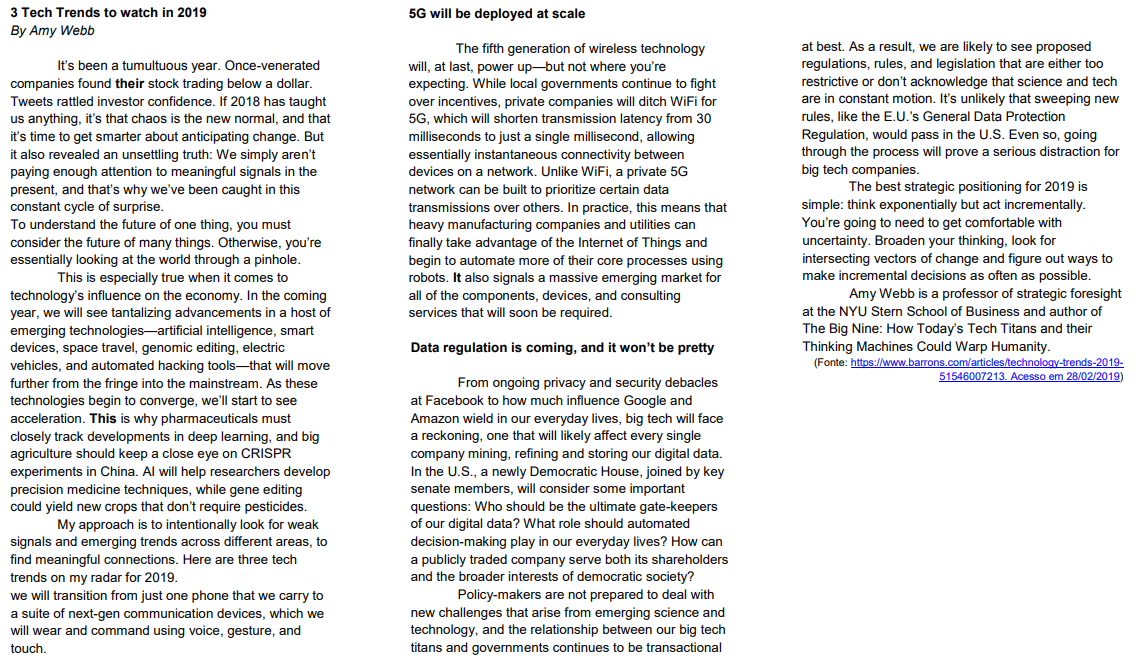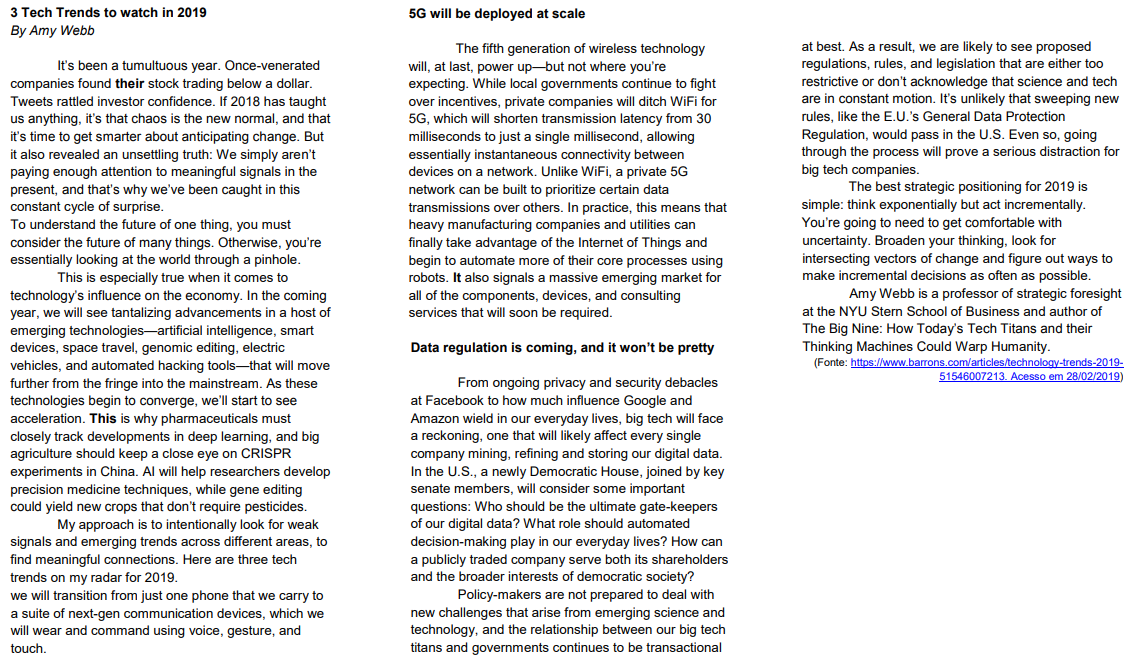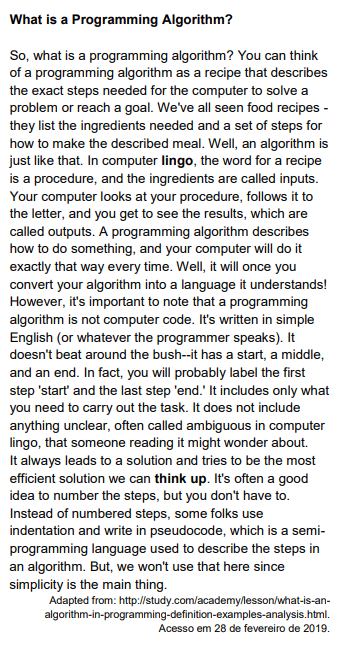Read the text below.

According to the text, the words vowed and prevented can be replaced by:
According to the text, the words vowed and prevented can be replaced by:
After going through several classifications proposed by learning strategies and personal observations, Menezes (2004) identified specific strategies used to learn vocabulary. These strategies are organized in four groups: metacognitive, cognitive, social and communication. Considering the author's understanding, read the examples of strategies used by some students and mark the alternative that corresponds to a cognitive strategy.
Segundo o texto, a implementação de algoritmos pode ser comparada a:
Literary texts can be used in classrooms as important sources for language learning. However, literature should not be presented only in order to highlight grammar structures or vocabulary, since literary texts, as social constructions, besides motivating students can also provide them with cultural knowledge and the experience of otherness. Literature through universal themes can develop empathy, creative thinking and sensitivity.
When introducing literary literacy as the appropriation of the text in its social use, Cosson (2012) develops a basic didactic sequence to approach literature in the classroom. Mark the alternative that corresponds to the steps of this didactic sequence in the order presented by the author.

Working with contextual reference is a useful strategy when approaching texts in English. Consider the following pronouns and mark the alternative that corresponds to what they refer to, respectively: I. their (first paragraph).
II. this (second paragraph).
III. its (fourth paragraph).
IV. it (fifth paragraph).
Pete is talking to his English teacher about the strategies he has been using to study at home. He seems to have forgotten the phrasal verbs he was studying and trying to use during this conversation in order to impress the teacher. Read an extract of their dialogue:
(…) (Pete) – Phrasal verbs are so difficult! Well, I have been studying really, really hard. I have to learn so many things before the tests. There are some things I have been doing… For example, I try to… to… memorize the expressions by reading them out loud several times a day.
(Teacher) – What else have you been doing that you consider effective? (Pete) – I try to use the expressions and new words in stories… but often times they don't… they don't… make sense.
(Teacher) – There's a phrasal verb for that.
(Pete) – I can't remember it! I have to understand how I learn better…
(Teacher) – Maybe you are exaggerating a bit.
(Pete) – I am not. I have problems… reaching the same level of my classmates.
(Teacher) – I don't agree with you, but if you feel you need to improve, we can talk about this later.
(Pete) – That would be great! Thank you!
If Pete had remembered the phrasal verbs he wanted to use in the conversation with his teacher in order to replace the expressions in bold, they would have followed this order:

Mark the alternative that best corresponds to the main idea of the text:
Read the extract of a text written by a student. The proposal was to write a letter of complaint to the manager of a store where the student, as a client, had a problem when he bought something online. The teacher explained the task and highlighted that students were supposed to come up with a situation, explaining what happened exactly and how they would like the situation to be solved. One of the criteria for correction was grammar accuracy, since the letter is supposed to be formal:
(…) To my surprise, when I opened the box, I realized that it did not contain the cell phone I had purchased. I had already bought other items from Luke's and I had never had any problems before. I was really anxious for my new cell phone and I just could not believe it. Though, I write this letter to inform you about what happened and to ask you for a refund or for the correct item. I called the store, but nobody could offer me a solution. People were a bit rude and I felt very disappointed. Never before had I been treated that way, which is why I also ask for a retraction. I am aware of the good quality of the products you sell. I have been a client for about 5 years. I hope this situation can be solved soon.
Looking forward to hearing from you,
Yours sincerely,
(…)
Mark the alternative that corresponds to a grammar inaccuracy, considering the context of the letter.
Hutchinson and Waters (1991) point out that English for Specific Purposes (ESP) emerged from three common reasons. One of them is related to the changes in the aim of linguistics, considering the variation from one language situation of use to another. Besides that, the expansion of technology and commerce after World War II, especially in the United States, explains why English became a necessity.
Mark the alternative that is related to the third reason why ESP became popular worldwide:
Kumaravadivelu (2001) points out that what is known as method has not been enough to fulfill language learning needs. Methods have been used as a set of practices designed by specialists in order to make language acquisition happen. However, according to Kumaravadivelu, studies have shown that the use of these sets of practices may have the opposite effect, since they do not seem to consider students' context, which prevents learning from being meaningful. For the author, a postmethod pedagogy has emerged from studies that focus on teachers' beliefs, reasoning and cognition. This postmethod condition is, therefore, a three-dimensional system consisting of three parameters.
Read the examples of practices below and mark the alternative that respectively corresponds to the three parameters that form the postmethod pedagogy system as described by Kumaravadivelu:
I. Teachers are able to theorize from their own practice, developing knowledge and skills.
II. Teachers identify problems, find solutions and go through a cycle of observation, reflection and action.
III. Teachers consider experiences brought to the classroom and provide an environment where linguistic and social needs are considered.


